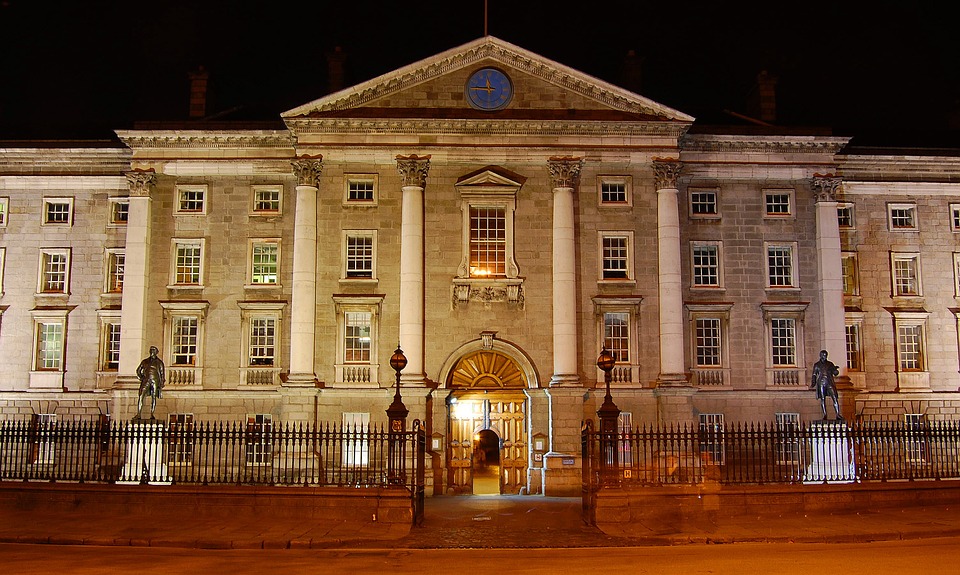On September 18, Dublin was raised to Level 3 restrictions in response to rising Covid-19 cases in the capital. The levelled guidance system was published by the government only three days previously.
Despite the guidelines indicating universities would remain open at Level 3 as long as they “escalate all appropriate protective measures / limit congregation”, the Minister for Further and Higher Education Simon Harris asked higher education institutions to minimise in-person teaching, quoting the “unique circumstances” of rising case numbers in Dublin coinciding with the beginning of the academic term.
These “enhanced measures” essentially placed the same restrictions on universities as they would experience at Level 4. Level 4 guidelines state that further and higher education institutions should “move online [with] on-site attendance only when essential”. In response to the Minister, Provost Patrick Prendergast confirmed that “only teaching which cannot readily be delivered online should be delivered in person”.
Covid restrictions have been applied on a give-and-take basis in Ireland. The acceptable risks are distributed unevenly, with certain sectors being sacrificed so that others can succeed. For example, wet pubs remained closed so that students could attend primary and secondary schools. The restrictions placed on Dublin universities were not in line with the guidelines the government published only days before September 18. The decision on September 25 to move all universities in the nation online for three weeks only further suggests that another sector has been prioritised over higher education.
In June, the provost announced that College was “committed to continuing with face-to-face education as a core element of the experience of attending Trinity” and instructed all students to return to Dublin except in cases where online learning was absolutely necessary. College has assured Trinity News that the statement on face-to-face teaching still stands even after the recent enhanced measures that accompanied Level 3 in Dublin.
One possible explanation for higher restrictions than originally outlined being placed on Dublin universities at Level 3 was the fear that an exodus of students would arrive from across the island to their accommodation in Dublin, bringing with them possible cases and new flatmates initially mixing multiple households. These students would also risk exporting the virus around the nation should they choose to return home on weekends or to visit family.
However, multiple students have already signed accommodation contracts and put down deposits. International students arrived weeks ago to quarantine for the designated 14 days, in the expectation of in-person teaching. Some students have already cancelled their accommodation contracts, wary of returning to Dublin during the new restrictions and the possibility that – like in March – these restrictions will continue beyond the initial three weeks. Others however are moving into accommodation regardless of the lack of in-person teaching, either not wanting to waste money or eager for independence after months spent at home. The lack of in-person teaching thus will not necessarily stem the tide of students arriving in Dublin.
This raises the question of when Trinity will return to face-to-face teaching. Most Irish universities were set to conduct this year through a hybrid model of in-person and online teaching.
Trinity has relied on an emphasis on face-to-face teaching to attract international students, many of which have already arrived in Ireland and paid their fees. It is possible, with less financial incentive to implement face-to-face teaching, and with many students without accommodation in Dublin after the confusion of the start of the academic year, that college could continue online until 2021.
While such a prospect might be a move welcomed by some students, it would be more challenging for others. Freshers especially could struggle considering the difficulties of living away from home, socialising virtually and learning how to study a new academic field. The Guardian reported on September 19 that universities in the UK are expecting record drop-out rates this year, based on the confluence of the difficulties of academic learning online as well as difficulties of student mental health for those who feel lonely or isolated.
Neither the government nor the College have clarified what “unique circumstances” the Minister believes merit extra restrictions for higher education, leaving students to speculate. These extra restrictions have only discouraged a small number from moving into their accommodation in the capital. While the government implies irresponsible student socialisation could spread the virus, many students are already in Dublin. With this in mind, it may be worth questioning the wisdom of Level 3 solely impacting face-to-face teaching, potentially the only form of student socialisation that College could ensure adhered to social distancing and mask-wearing guidelines.
While this is uncharted terrain for everybody involved it is important that College takes the welfare of its students seriously during this time. Restrictions on universities are set to lift after three weeks, but the unpredictable nature of the coronavirus makes it difficult to set an exact date for the reopening of college with many courses still uncertain about when or if they will conduct face-to-face teaching.
In an email circulated to students on September 18 the provost stated: “It is not what we would have wished, but these measures are mandated and are in the public interest.” With growing fears over third-level institutions contributing to the spread of coronavirus, students will have to wait to find out just how much the government and College really consider in-person teaching and student interaction “a core element of the experience of attending Trinity”.






